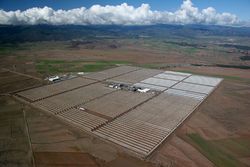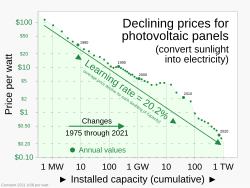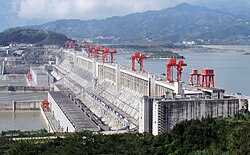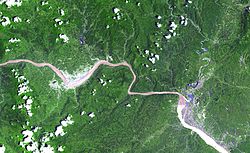Renewable energy
Renewable energy comes from renewable resources.[1] It is different from fossil fuels as it does not produce as many greenhouse gases and other pollutants as fossil fuel combustion.
People have used traditional wind power, hydropower, biofuel, and solar energy for many centuries, all around the world. The mass production of electricity using renewable energy sources is now becoming more common.[2]

Growth of renewables
From the end of 2004, worldwide renewable energy capacity grew at rates of 10–60% annually for many technologies. For wind power and many other renewable technologies, growth sped up in 2009 relative to the previous four years. More wind power was added during 2009 than any other renewable technology.[3] However, grid-connected PV increased the fastest of all renewables technologies, with a 60% annual average growth rate.
| Selected renewable energy global indicators[4][5][6] | 2008 | 2009 | 2010 | 2011 | 2012 | 2013 |
|---|---|---|---|---|---|---|
| Investment in new renewable capacity (annual) (109 USD) | 130 | 160 | 211 | 257 | 244 | 214 |
| Renewables power capacity (existing) (GWe) | 1,140 | 1,230 | 1,320 | 1,360 | 1,470 | 1,560 |
| Hydropower capacity (existing) (GWe) | 885 | 915 | 945 | 970 | 990 | 1,000 |
| Wind power capacity (existing) (GWe) | 121 | 159 | 198 | 238 | 283 | 318 |
| Solar PV capacity (grid-connected) (GWe) | 16 | 23 | 40 | 70 | 100 | 139 |
| Solar hot water capacity (existing) (GWth) | 130 | 160 | 185 | 232 | 255 | 326 |
| Ethanol production (annual) (109 litres) | 67 | 76 | 86 | 86 | 83 | 87 |
| Biodiesel production (annual) (109 litres) | 12 | 17.8 | 18.5 | 21.4 | 22.5 | 26 |
| Countries with policy targets for renewable energy use |
79 | 89 | 98 | 118 | 138 | 144 |
Projections vary, but scientists have advanced a plan to power 100% of the world's energy with wind, hydroelectric, and solar power by the year 2030.[7]
Wind power market grows
- Main articles: Wind farm and List of large wind farms.
Wind power capacity has expanded quickly to 743 GW in 2020, and wind energy production was about 5% of total worldwide electricity usage, and growing fast.[8] Wind power is widely used in European countries, and more recently in the United States and Asia.[9][10] Wind power accounts for approximately 19% of electricity generation in Denmark, 11% in Spain and Portugal, and 9% in the Republic of Ireland.[11] These are some of the largest wind farms in the world, as of January 2010:

| Wind farm | Current capacity (MW) |
Country | Notes |
|---|---|---|---|
| Gansu Wind Farm | 8,000 | [13][14] | |
| Alta (Oak Creek-Mojave) | 1,320 | [15] | |
| Jaisalmer Wind Park | 1,064 | [16] | |
| Shepherds Flat Wind Farm | 845 | [17] | |
| Roscoe Wind Farm | 782 | [18] | |
| Horse Hollow Wind Energy Center | 736 | [19][20] | |
| Capricorn Ridge Wind Farm | 662 | [19][20] | |
| Fântânele-Cogealac Wind Farm | 600 | [21] | |
| Fowler Ridge Wind Farm | 600 | [22] | |
| Whitelee Wind Farm | 539 | [23] |
A wind farm is a group of wind turbines in the same location used for production of electricity. A large wind farm may consist of several hundred individual wind turbines distributed over an extended area, but the land between the turbines may be used for agricultural or other purposes. A wind farm may also be located offshore. [24]
World's largest PV power plants

Solar photovoltaic cells convert sunlight into electricity and many solar photovoltaic power stations have been built, mainly in Europe.[25] As of December 2010, the largest photovoltaic (PV) power plants in the world are the Sarnia Photovoltaic Power Plant (Canada, 97 MW), Montalto di Castro Photovoltaic Power Station (Italy, 84.2 MW), Finsterwalde Solar Park (Germany, 80.7 MW), Rovigo Photovoltaic Power Plant (Italy, 70 MW), Olmedilla Photovoltaic Park (Spain, 60 MW), the Strasskirchen Solar Park (Germany, 54 MW), and the Lieberose Photovoltaic Park (Germany, 53 MW).[25] Larger power stations are under construction, some proposed will have a capacity of 150 MW or more.[26]
Solar is one of the fastest-growing renewable energy sources in the world. Solar energy capacity has increased by approximately 60% since 2013, rising to 485.82GW in 2018.
The ten largest solar power plants in the world (based on installed capacity in 2020)
- Tengger Desert Solar Park, China – 1,547MW
- Sweihan Photovoltaic Independent Power Project, UAE – 1,177MW
- Yanchi Ningxia Solar Park, China – 1,000MW
- Datong Solar Power Top Runner Base, China – 1,070MW
- Kurnool Ultra Mega Solar Park, India – 1,000MW
- Longyangxia Dam Solar Park, China – 850MW
- Enel Villanueva PV Plant, Mexico – 828MW
- Kamuthi Solar Power Station, India – 648MW
- Solar Star Projects, US – 579MW
- Topaz Solar Farm / Desert Sunlight Solar Farm, US – 550MW
Many of these plants are integrated with agriculture and some use innovative tracking systems that follow the sun's daily path across the sky to generate more electricity than conventional fixed-mounted systems. There are no fuel costs or emissions during operation of the power stations.
New generation of solar thermal plants

Large solar thermal power stations include the 354 megawatt (MW) Solar Energy Generating Systems power installation in the USA, Solnova Solar Power Station (Spain, 150 MW), Andasol solar power station (Spain, 100 MW), Nevada Solar One (USA, 64 MW), PS20 solar power tower (Spain, 20 MW), and the PS10 solar power tower (Spain, 11 MW). The 370 MW Ivanpah Solar Power Facility, located in California's Mojave Desert, is the world’s largest solar thermal power plant project currently under construction.[28]
The solar thermal power industry is growing fast with 1.2 GW under construction as of April 2009 and another 13.9 GW announced globally through 2014. Spain is the epicenter of solar thermal power development with 22 projects for 1,037 MW under construction, all of which are projected to come online by the end of 2010.[29] In the United States, 5,600 MW of solar thermal power projects have been announced.[30] In developing countries, three World Bank projects for integrated solar thermal/combined-cycle gas-turbine power plants in Egypt, Mexico, and Morocco have been approved.[31]
Variable renewable energy
Variable renewable energy is a renewable energy source that is non-dispatchable due to its fluctuating nature, like wind power and solar power, as opposed to a controllable renewable energy source such as hydroelectricity, or biomass, or a relatively constant source such as geothermal power or run-of-the-river hydroelectricity. Critics of wind and solar power warn of their variable output, but many studies have shown that the grid can cope, and it is doing so in Denmark and Spain.[32]
The International Energy Agency says that there has been too much focus on issue of the variability.[33] Its significance depends on a range of factors which include the market penetration of the renewables concerned, the balance of plant, and the wider connectivity of the system, as well as demand side flexibility. Variability will rarely be a barrier to increased renewable energy deployment. But at high levels of market penetration it requires careful analysis and management.[33]
Ethanol for transportation
Brazil has one of the largest renewable energy programs in the world, involving production of ethanol fuel from sugar cane, and ethanol now provides 18 percent of the country's automotive fuel. As a result, Brazil, which years ago had to import a large share of the petroleum needed for domestic consumption, recently reached complete self-sufficiency in oil.[34]
Most cars on the road today in the U.S. can run on blends of up to 10% ethanol, and motor vehicle manufacturers already produce vehicles designed to run on much higher ethanol blends. Ford, DaimlerChrysler, and General Motors Corporation are among the automobile companies that sell "flexible-fuel" cars, trucks, and minivans that can use gasoline and ethanol blends ranging from pure gasoline up to 85% ethanol (E85). By mid-2006, there were approximately six million E85-compatible vehicles on U.S. roads.[35]
Renewable EnergyRelated Pages Media
Renewable energy capacity has steadily grown, led by solar photovoltaic power.
Swanson's law–stating that solar module prices have dropped about 20% for each doubling of installed capacity—defines the "learning rate" of solar photovoltaics.
Sunrise at the Fenton Wind Farm in Minnesota, United States
The Three Gorges Dam for hydropower on the Yangtze River in China
Three Gorges Dam and Gezhouba Dam, China
Related pages
Notes
| Wikimedia Commons has media related to Lua error in Module:Commons_link at line 62: attempt to index field 'wikibase' (a nil value).. |
| Wikinews has : |
- ↑ Resources that for all practical purposes cannot be used up: United States Department of Energy Glossary of energy-related terms (URL accessed Dec 21, 2006)
- ↑ Reporter, Staff (2022-07-10). "The concept of green technology in the modern World". Khaleej Mag - News and Stories from Around the World. Retrieved 2022-08-21.
- ↑ "Wind Energy: Understanding the Benefits and Challenges". 14 January 2023. Archived from the original on 20 March 2023. Retrieved 16 February 2023.
- ↑ REN21 (2012). Renewables Global Status Report 2012 Archived 2012-12-15 at the Wayback Machine p. 17.
- ↑ "REN21 2013 Renewables Global Status Report" (PDF). Retrieved 2014-01-30.
- ↑ http://www.ren21.net/Portals/0/documents/Resources/GSR/2014/GSR2014_full%20report_low%20res.pdf
- ↑ Jacobson, Mark Z.; Delucchi, M.A. (November 2009). "A Path to Sustainable Energy by 2030" (PDF). Scientific American. 301 (5): 58–65. Bibcode:2009SciAm.301e..58J. doi:10.1038/scientificamerican1109-58 (inactive 2024-11-02). PMID 19873905.
{{cite journal}}: CS1 maint: DOI inactive as of November 2024 (link) - ↑ The World Wind Energy Association (2014). 2014 Half-year Report. WWEA. pp. 1–8.
- ↑ Global wind energy markets continue to boom – 2006 another record year Archived 2011-04-07 at the Wayback Machine (PDF).
- ↑ Global Wind Energy Council (2009). Global Wind 2008 Report Archived 2011-04-07 at the Wayback Machine, p. 9, accessed on January 4, 2010.
- ↑ International Energy Agency (2009). IEA Wind Energy: Annual Report 2008 Archived 2011-09-29 at the Wayback Machine p. 9.
- ↑ "GWEC – Representing the global wind energy industry".
- ↑ Watts, Jonathan & Huang, Cecily. Winds Of Change Blow Through China As Spending On Renewable Energy Soars, The Guardian, March 19, 2012, revised on March 20, 2012. Retrieved January 4, 2012.
- ↑ Xinhua: Jiuquan Wind Power Base Completes First Stage, Xinhua News Agency, November 4, 2010. Retrieved from ChinaDaily.com.cn website January 3, 2013.
- ↑ Terra-Gen Press Release Archived 2015-09-02 at the Wayback Machine, 17 April 2012
- ↑ Reporter, B. S. (11 May 2012). Suzlon creates country's largest wind park. https://www.business-standard.com/article/companies/suzlon-creates-country-s-largest-wind-park-112051100101_1.html.
- ↑ Mills, Erin (July 12, 2009). "Shepherds Flat farm lifts off". East Oregonian. http://renewableenergyhub.co.uk/. Retrieved 11 December 2009.
- ↑ "E.ON Delivers 335-MW of Wind in Texas". Archived from the original on 2016-01-05. Retrieved 2014-11-08.
- ↑ 19.0 19.1 "Drilling Down: What Projects Made 2008 Such a Banner Year for Wind Power?". www.renewableenergyworld.com. Archived from the original on 2016-01-06. Retrieved 2014-11-08.
- ↑ 20.0 20.1 "AWEA: U.S. Wind Energy Projects – Texas". Archived from the original on 2007-12-29. Retrieved 2014-11-08.
- ↑ Webdesign, FG Forrest, a s , fg {zavináč} fg {tečka} cz-Content Management System- Edee CMS; SYMBIO Digital, s r o-. "CEZ Group - The Largest Wind Farm in Europe Goes Into Trial Operation". www.cez.cz.
- ↑ "Renewable Energy Impact on Environment". 8 January 2023. Archived from the original on 20 March 2023. Retrieved 13 January 2023.
- ↑ "Whitelee Windfarm - ScottishPower". www.scottishpower.co.uk.
- ↑ "Best Wind Turbine for Home Use". 15 January 2023. Archived from the original on 18 January 2023. Retrieved 16 February 2023.
- ↑ 25.0 25.1 Denis Lenardic. Large-scale photovoltaic power plants ranking 1 - 50 PVresources.com, 2010.
- ↑ Mark Z. Jacobson (2009). Review of Solutions to Global Warming, Air Pollution, and Energy Security Archived 2010-06-02 at the Wayback Machine p. 4.
- ↑ Edwin Cartlidge (18 November 2011). "Saving for a rainy day". Science (Vol 334). pp. 922–924.
{{cite web}}: Missing or empty|url=(help) - ↑ Todd Woody. In California’s Mojave Desert, Solar-Thermal Projects Take Off Archived 2010-11-05 at the Wayback Machine Yale Environment 360, 27 October 2010.
- ↑ "Global Concentrated Solar Power Industry to Reach 25 GW by 2020". Archived from the original on 2011-10-26. Retrieved 2011-01-02.
- ↑ "Relocation of the Solar Energy Projects Page". www.energy.ca.gov. Archived from the original on 2018-12-16. Retrieved 2019-02-11.
- ↑ REN21 (2008). Renewables 2007 Global Status Report (PDF) Archived 2018-07-10 at the Wayback Machine p. 12.
- ↑ Amory Lovins (2011). Reinventing Fire, Chelsea Green Publishing, p. 199.
- ↑ 33.0 33.1 "Contribution of Renewables to Energy Security" (PDF). Archived from the original (PDF) on 2019-05-02. Retrieved 2014-11-13.
- ↑ "America and Brazil Intersect on Ethanol". Archived from the original on 2007-09-26. Retrieved 2007-06-05.
- ↑ "American energy: The renewable path to energy security" (PDF).
Other websites
| Wikinews has : |
- The Climate Change Guide easy-to-understand information on Renewable energy
- US National Renewable Energy Laboratory (NREL).
- Whats Biomass Energy.
- EPA uses onsite renewable technologies
- New World Record achieved in solar cell technology Archived 2009-07-12 at the Wayback Machine
- Energy conservation at home in Simple Wikibooks Archived 2008-05-29 at the Wayback Machine
- Renewables 2011: Global Status Report Archived 2011-09-05 at the Wayback Machine











